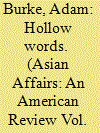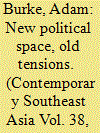| Srl | Item |
| 1 |
ID:
117650


|
|
|
|
|
| Publication |
2012.
|
| Summary/Abstract |
Many foreign aid agencies promote peacebuilding as a global policy objective. This paper considers how they have fared in practice in subnational, "peripheral" conflicts in Asia that have relatively low international profiles, using case material from Aceh in Indonesia, the Far South of Thailand, and Sri Lanka. Foreign aid has supported long-term economic growth in these countries but typically failed to address peacebuilding concerns or associated inequalities between ethnic groups. Many barriers limit the scope to promote peacebuilding, stemming from recipient governments' reluctance to accept external involvement and from aid agencies' own limitations. Those agencies that do address conflict concerns tend not to use technical peacebuilding tools or methodologies. Instead, they prioritize the root causes of conflicts, recognizing human rights protection and equality of opportunity as policy aims. They also devise responses locally, build good relationships with governments, and work incrementally from a strong knowledge base. Wider adoption of similar policy objectives and practice would enable further small-scale peacebuilding initiatives.
|
|
|
|
|
|
|
|
|
|
|
|
|
|
|
|
| 2 |
ID:
146703


|
|
|
|
|
| Summary/Abstract |
Violence in Rakhine State of Myanmar in 2012 and 2013 caused up to 1,000 deaths and forced the long-term displacement of entire communities. Using evidence from interviews, media coverage and secondary literature, this article explores recent events and considers contextual factors behind the unrest. The conflict is a symptom of long-term historical tensions between Rakhine Buddhists and Muslims, and contemporary political changes that reinvigorated anti-Muslim sentiment across Myanmar. Rigid ethnic classifications that are enshrined in Myanmar’s laws and political system have encouraged territorial attitudes and furthered discrimination against Muslims and others perceived as migrants. This environment generates incentives for local politicians to strengthen group identity and present themselves as the guardians of their electorate. Raised tensions and a background of violence made it easier for Rakhine politicians to promote identity-based voting and to ensure that most Muslim voters in Rakhine State were disenfranchised, paving the way for some local success in the national elections of November 2015. Following the elections, Aung San Suu Kyi’s new government indicated that past policies would continue, disappointing those hoping for rapid change and demonstrating the entrenched nature of Rakhine State’s problems.
|
|
|
|
|
|
|
|
|
|
|
|
|
|
|
|
| 3 |
ID:
073873


|
|
|